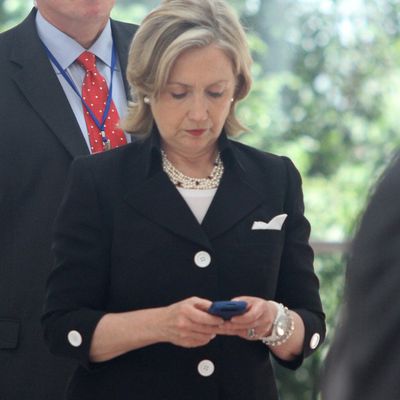
“Find me one persuadable voter who agrees with HRC on the issues but will vote against her because she has a non-archival-compliant email system,” argues Democratic strategist Paul Begala, “and I’ll kiss your ass in Macy’s window and say it smells like roses.” Political scientist Brendan Nyhan likewise suggests the story about Hillary Clinton’s noncompliant email is extremely unlikely to influence her election outcomes.
It is certainly true that Clinton’s email practices do not amount to any kind of disqualifying scandal. It’s a violation of administration policy, not the law, and it’s not unique. It is also likely true that nobody will remember or care a year and a half from now; if the economy keeps creating a quarter million jobs a month between now and then, Clinton could probably win even if she turns out to have hosted her emails on a North Korean server. But all this misses the flashing red lights set off by this story.
The most alarming direct outcome is the possibility that demands by Congress and the media for her private email pry open some new, more serious motivations. The Clinton impeachment ultimately grew out of a spiraling investigation that began by poking into Whitewater, which turned out to be a non-scandal. The Clinton email disclosures grew out of the investigation of Benghazi, which was also a non-scandal that likewise survives only in conservative fever dreams. Investigations that pry into internal correspondence, even those based on a groundless suspicion, can eventually yield, or create, meta-scandals of their own.
The larger problem for Clinton, though, is not the likelihood that her emails will turn up incriminating evidence. It is what this episode reveals about her political judgment and managerial acumen. Last year, Maggie Haberman and Glenn Thrush wrote a deeply reported and highly revealing account of Clinton’s deep terror of the news media. Their fear of hostile news media, borne out of genuinely traumatic ‘90s-era experiences in which right-wing pseudo-media drove the mainstream news agenda, left the Clintons paralyzed by suspicion of the press. They are reflexively insular. Their suspicion creates problems where none need exist.
This revives the larger question of whether Clinton is capable of managing a competent campaign (and thus, in turn, a competent administration). Her previous campaign went down to defeat, under much less favorable circumstances than today (she faced a stronger challenger in Barack Obama than she could ever face this time, the Iraq War gave her a major liability, and her polling leads were smaller). That said, her campaign was run dismally, as Josh Green’s postmortem account (published in the heat of the 2008 general election, when most public attention was focused on Obama versus McCain) alarmingly revealed:
The anger and toxic obsessions overwhelmed even the most reserved Beltway wise men. Surprisingly, Clinton herself, when pressed, was her own shrewdest strategist, a role that had never been her strong suit in the White House. But her advisers couldn’t execute strategy; they routinely attacked and undermined each other, and Clinton never forced a resolution. Major decisions would be put off for weeks until suddenly she would erupt, driving her staff to panic and misfire.
Nor did the shock of defeat pry Clinton away from her dysfunctional tendencies. After her appointment as secretary of State, she sought to hire Sidney Blumenthal, one of the longtime loyalists who fed her most paranoid and self-destructive tendencies. The Obama administration blocked this appointment. Clinton went on getting advice from him anyway.
In the interim, of course, both Clintons have managed parallel private careers as private speakers and managers of a sprawling charitable foundation. Both these endeavors appear to have been badly managed and shot through with questionable ethical practices. Attempts to clean up the Clinton Foundation have mostly failed.
And then, just this last August, reports Edward-Isaac Dovere, Clinton’s aides discovered her failure to comply with administration email policy. They decided not to do anything about it.
Now, it is possible that the new Clinton campaign (and prospective administration) will function at a higher level. Clinton has brought on well-regarded Democratic advisers like John Podesta and Jennifer Palmieri, who have built successful reputations for the Democratic Party rather than attaching themselves completely to the Clintons. It is plausible that they can impose some order and rationality onto the Clinton operation. The dangerous scenario is that they will not; that the Clintons will continue to retreat into their insular and dysfunctional shell, surrounded by often-feuding and ineffective personal loyalists. Or, worse, that even competent advisers won’t be able to spare the Clintons from chronic bad judgment.






























